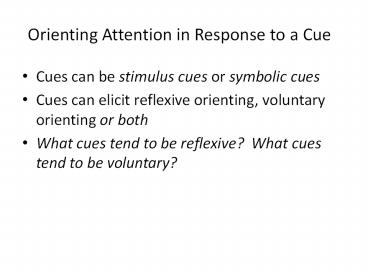Orienting Attention in Response to a Cue - PowerPoint PPT Presentation
1 / 20
Title:
Orienting Attention in Response to a Cue
Description:
Orienting Attention in Response to a Cue. Cues can be stimulus cues or symbolic cues ... relatively recent objects are 'flagged' while older objects are disregarded ... – PowerPoint PPT presentation
Number of Views:173
Avg rating:3.0/5.0
Title: Orienting Attention in Response to a Cue
1
Orienting Attention in Response to a Cue
- Cues can be stimulus cues or symbolic cues
- Cues can elicit reflexive orienting, voluntary
orienting or both - What cues tend to be reflexive? What cues tend
to be voluntary?
2
Voluntary Orienting
- Symbolic cues tend to trigger voluntary orienting
Symbolic Cue
Symbolic cues may orient attention towards
another location. Stimulus cues orient attention
to the stimulated location.
3
Reflexive Orienting
- Attention can be automatically summoned to a
location at which an important event has
occurred
4
Reflexive Orienting
- Attention can be automatically summoned to a
location at which an important event has
occurred - Loud noise
- Motion
- New Object
- We call this attentional capture
Transients
5
Reflexive Orienting
- The Posner cueing paradigm (with blinking boxes)
confounds reflexive and voluntary orienting
in what way?
6
Reflexive Orienting
- The Posner cueing paradigm (with blinking boxes)
confounds reflexive and voluntary orienting - How could we change the Posner cueing paradigm to
make it asses only reflexive orienting?
7
Reflexive Orienting
- The Posner cueing paradigm (with blinking boxes)
confounds reflexive and voluntary orienting - How could we change the Posner cueing paradigm to
make it asses only reflexive orienting? - Make validity 50 (non-informative cue)
8
Reflexive Orienting
- The Posner cueing paradigm (with blinking boxes)
confounds reflexive and voluntary orienting - How could we change the Posner cueing paradigm to
make it asses only reflexive orienting? - Make validity 50 (non-informative cue)
- Viewers are still faster and more accurate!
9
Reflexive Orienting
- Can symbolic cues be reflexive?
Almost never but
10
Reflexive Orienting
- Can symbolic cues be reflexive?
Reflexive orienting to direction of eye gaze
11
Reflexive Orienting
- Potential cues for Reflexive Orienting
- Loud noise
- Motion
- New Object
- New Objects are powerful attention grabbers!
Transients
12
New Objects Capture Attention
IS THERE AN H?
Initial scene viewed for several hundred ms
Yantis Jonides (1990) New-Object Paradigm
13
New Objects Capture Attention
IS THERE AN H?
New scene search for target letter
H may be revealed from an 8 or may appear as a
new object
Yantis Jonides (1990) New-Object Paradigm
14
Reflexive Orienting
- Steven Yantis and colleagues
- Result
15
Reflexive Orienting
- Steven Yantis and colleagues
- Result
Targets are found faster when they are new
objects than when they are revealed from old
objects
16
Reflexive Orienting
- Steven Yantis and colleagues
- Interpretation
The visual system prioritizes in dealing with
visual objects - relatively recent objects are
flagged while older objects are disregarded
17
Disordered Attention and Consciousness
- Sensory information must be attended for it to be
entered into awareness
18
Disordered Attention and Consciousness
- The attention orienting system can be damaged
which leads to hemispatial neglect or extinction - The attention orienting mechanism can be confused
leading to something called change blindness
19
Disordered Attention and Consciousness
- Change blindness
- Change blindness shows us that the feeling of
being in a detailed visual environment is really
just an illusion - We only have access to the parts of the scene to
which we have attended
20
Disordered Attention and Consciousness
- Change blindness
- Change blindness shows us that the feeling of
being in a detailed visual environment is really
just an illusion - We only have access to the parts of the scene to
which we have attended - And that is often not very much!































